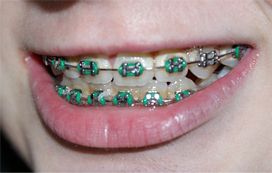Custom Mouthguards: Find The Right Protection For You And Your Braces

Let’s be honest: braces are not fun to wear.
They’re painful, uncomfortable and get in the way of everything. They’re also expensive and easily damaged.
Playing sports in braces is even less fun, as all of those factors become magnified. After all, braces are basically just a bunch of metal strapped to your teeth. While you should always wear proper protection and make safety a top priority, protecting your braces on the field, court or ice is even more vital.
How do you find the right protection for you and your braces? Here are a few simple tips to select the braces mouthguard that’s right for you:
1. All The Right Moves
Why do you wear braces? Braces help to slowly move your teeth into the ideal position for a perfect, winning smile.
However, when teeth don’t have enough room to move — from, say, a mouthguard that is too restricting — your braces are unable to do their job. And that inhibited movement may risk harming you or your orthodontic work.
Your mouthguard must allow space for your teeth to shift comfortably, without sacrificing any effectiveness. Designed to allow movement and growth, braces mouthguards help hold your guard in place, while providing proper space for your teeth to move into a new position.
2. Full Metal Bracket
Of course, when you have braces, it’s not just your teeth that need room; your brackets do too.
The brackets and wires of your braces must have space in the mouth, or else they’ll become irritated. And irritating the brackets in your mouth is not a hard thing to do, as you likely are very well aware.
When your brackets are irritated, you become uncomfortable — extremely uncomfortable. So the thought of wearing a mouthguard that presses against your braces probably doesn’t sound like the greatest idea.
Thankfully braces mouthguards don’t just have the ability to fit perfectly over braces without inhibiting tooth growth and alignment, they also provide ample room for the brackets to be uncompromised. And because they have enough room, your orthodontist is able to make adjustments without you needing to get a new mouthguard.
3. A Perfect Fit
Brace yourself — no pun intended — because this may sound crazy … but, while you need to allow room for both tooth movement and the brackets, your mouthguard still must fit tightly and securely against your upper teeth.
Seems counterintuitive, right? Maybe; but believe it or not, you are able to protect yourself and your braces while remaining as comfortable as possible.
Whether you have braces or not, it’s essential to make sure that your mouthguard stays in the proper position against your upper teeth without needing to bite or clench down to keep it in place. When a mouthguard doesn’t fit correctly, there is no guarantee the mouthguard is going to be in place when impact comes.
When it comes to fit, comfort and room to grow, only a custom made braces mouthguard gives you and your braces the protection you need.




 Let’s be honest: braces are not fun to wear.
Let’s be honest: braces are not fun to wear.
